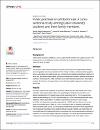Public practices on antibiotic usage: A cross-sectional study among college students and their family members
| Author | Aljayyousi, Ghadir Fakhri |
| Author | Abdel-Rahman, Manar E. |
| Author | El- Heneidy, Asmaa |
| Author | Kurdi, Rana |
| Author | Faisal, Eman |
| Available date | 2019-12-11T11:06:37Z |
| Publication Date | 2019-11 |
| Publication Name | PLOS ONE |
| Identifier | http://dx.doi.org/10.1371/journal.pone.0225499 |
| Citation | Aljayyousi GF, Abdel-Rahman ME, ElHeneidy A, Kurdi R, Faisal E (2019) Public practices on antibiotic use: A cross-sectional study among Qatar University students and their family members. PLoS ONE 14(11): e0225499. |
| Abstract | Background Antimicrobial resistance (AMR) is a serious public health problem and a global concern. The inappropriate use of antibiotics has been identified by the World Health Organization as a major risk factor for AMR. Methods The purpose of this research study is to assess the prevalence of inappropriate antibiotic use among Qatar University students and their family members, detect sociodemographic factors associated with inappropriate use, evaluate the knowledge and attitude towards antibiotic use, and assess respondents’ opinions on healthcare providers’ antibiotic prescription practices. Participants (N = 596) completed a self-administered questionnaire. Descriptive analysis, the Pearson chi-squared test, and multivariate logistic regression analyses were performed. Results The major inappropriate antibiotic use practices followed by the respondents were using antibiotics without prescription (82%), not completing the antibiotic course (45%), and obtaining antibiotics from the pharmacy without prescription (23%). The chi-square test results showed that age (p = 0.031) and nationality (p = 0.041) were associated with using antibiotics without prescription. In addition, respondents less than 21 years of age (p<0.001), who had only a secondary education (p = 0.007), and who lived in one of the large and crowded cities in Qatar (p = 0.011) had higher odds of stopping the antibiotic before completing the course. Our study also revealed that almost 60% of the respondents had inadequate knowledge and a negative attitude towards antibiotic use. Nationality and municipality were the independent factors associated with having appropriate knowledge of antibiotic use. Univariate logistic regression analyses in our study demonstrated that older (>26 years), married and university-graduated participants were more likely to have a positive attitude towards antibiotic use than others. Respondents also reported that neither doctors nor pharmacists were providing adequate patient education about appropriate antibiotic use. The Socio-Ecological Model was applied to interpret the findings and frame implications. Conclusion The findings shed light on various factors shaping antibiotic use practices and provide evidence to design multilevel behavioral interventions to improve public practices of antibiotic use. |
| Language | en |
| Publisher | Public Library of Science |
| Subject | knowledge; practice antibiotics attitude |
| Type | Article |
| Pagination | 1-22 |
| Issue Number | 11 |
| Volume Number | 14 |
| ESSN | 1932-6203 |
Files in this item
This item appears in the following Collection(s)
-
Public Health [380 items ]


